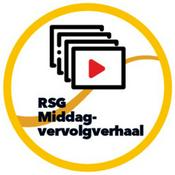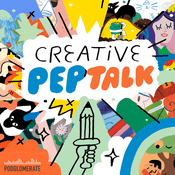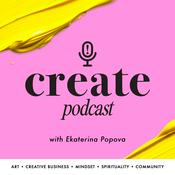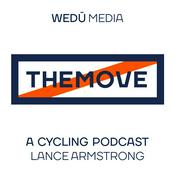571 episodes
- Send a text
One honest mistake can feel like a verdict on your calling. We’ve been there—rejected shows, failed pieces, spirals of self-doubt—and we know how quickly disappointment tries to rewrite your identity. Today we walk through a clear, grace-filled path to recover emotionally and spiritually after creative setbacks, so you can return to the studio lighter, wiser, and free.
We start by naming how disappointment opens the door to lies and why artists are uniquely vulnerable when work feels personal. Then we draw a sharp line between conviction and condemnation: conviction invites growth and intimacy, while condemnation sentences you to shame. From there, we share a practical five-step process you can use any time things go sideways: separate facts from identity, expose condemnation out loud, re-anchor yourself in the truth of who you are in Christ, let the situation teach instead of torment, and take one simple step in the opposite spirit—whether that’s a sketch, an hour in the studio, or an honest conversation. Along the way, Matt shares a recent misstep from his own practice and how he stopped the spiral by returning to scripture, prayer, and small, faithful action.
You’ll also join us in a guided moment of prayer to hear God’s heart for you and ask for specific wisdom for your next step. We close by inviting testimony and community, because sharing your story breaks isolation and strengthens others to believe the truth. If you’re tired of letting one bad day redefine your worth, this conversation will help you build creative resilience, renew your mind, and create from God’s pleasure—not for it.
If this resonated, subscribe, leave a review, and share it with an artist who needs freedom today. Want deeper support? Explore our Foundations Course for Christian artists and start rebuilding on solid ground.
Fuel Your Creative Calling with Weekly Encouragement
Join thousands of Christian artists who are growing in faith, creativity, and purpose.
Subscribe to The Thriving Christian Artist Weekly and receive powerful, faith-filled content every week—designed to encourage your heart, spark your creativity, and equip you to walk boldly in your God-given calling as an artist.
👉 Click here. It’s free. It’s faith-filled. And it’s just for you. - Send a text
What would change if you stopped playing it safe and said a full, unapologetic yes to your creative calling? We unpack the five shifts that begin the moment you surrender the hustle and create from identity: peace replaces pressure, favor opens doors, your art becomes an encounter, provision flows with integrity, and fresh ideas arrive on demand. Along the way, we share stories from the studio, practical steps to steward your gift, and scriptures that ground the journey without turning creativity into performance.
We talk candidly about moving from striving to sonship—the difference between creating for approval and creating from love. You’ll hear how opportunities start aligning when you stop tweaking the algorithm and start honoring your gift, why collectors and collaborators respond to clarity, and how your work can carry presence without turning preachy. We dig into pricing with dignity, shedding guilt about profit, and building simple systems that support flow: daily rhythms, capture habits, and creative rest that multiplies output instead of draining it.
There’s also a vital warning: pushback often shows up right when momentum builds. We name the common forms—doubt, distractions, tech glitches—and share tools to keep going. Then we point to the secret multiplier: community. When artists run with artists who share faith, craft, and courage, resilience rises and isolation loses its grip. If you’re ready to trade anxiety for alignment and let your studio become a place of peace, favor, and transformation, this conversation is your map.
If this spoke to you, subscribe, share it with an artist friend, and leave a review to help others find the show. Ready to lay a solid foundation? Check out the foundations course and join a global community of artists on the same journey.
Fuel Your Creative Calling with Weekly Encouragement
Join thousands of Christian artists who are growing in faith, creativity, and purpose.
Subscribe to The Thriving Christian Artist Weekly and receive powerful, faith-filled content every week—designed to encourage your heart, spark your creativity, and equip you to walk boldly in your God-given calling as an artist.
👉 Click here. It’s free. It’s faith-filled. And it’s just for you. - Send us a text
Pressure isn’t a prerequisite for great art. We walk through five biblical principles that turn the studio into a sacred place of connection, courage, and craft: abiding in the vine, receiving creativity as a gift, offering your work back to God, marrying Spirit with skill, and rooting identity in Christ so risk becomes a runway instead of a cliff. These aren’t abstract ideas; they’re battle-tested rhythms that have reshaped decades of creative work and helped thousands of artists find freedom, focus, and fruit.
We start with John 15 and the relief of creating as a connected branch rather than a lone tree. From there, we reframe the studio as a dwelling place, not just a workspace, where worship and work mingle and fruit flows naturally. Romans 12:1 guides us to see art as worship—whether your calling is personal devotion, ministry, or the marketplace—so results no longer determine value. Then we explore the “two wings” from Exodus 31: being filled with the Spirit and skilled in the craft. Excellence becomes love made visible, a carrier of presence that honors the message instead of competing with it.
Identity changes everything. When worth is secured in Christ, exploration gets bolder and mistakes lose their sting. We talk through the mindset shifts that free you to try, iterate, and grow without fear of losing yourself. Finally, we anchor the journey in perseverance. Galatians 6 and James 1 promise harvest to those who keep showing up, even when progress feels slow. Consistency beats intensity, small wins compound, and God works in both process and product to form you for greater things.
If these principles stirred something in you, subscribe, leave a review, and share this with a creative friend who needs fresh hope. Ready to build these rhythms with support? Join our Created to Thrive Foundations course—nine lessons, daily projects, and a community of Christian artists walking this path together.
Find out more about The Created to Thrive Foundations Course
Fuel Your Creative Calling with Weekly Encouragement
Join thousands of Christian artists who are growing in faith, creativity, and purpose.
Subscribe to The Thriving Christian Artist Weekly and receive powerful, faith-filled content every week—designed to encourage your heart, spark your creativity, and equip you to walk boldly in your God-given calling as an artist.
👉 Click here. It’s free. It’s faith-filled. And it’s just for you. - Send us a text
What if the reason your art feels heavy isn’t skill, time, or tools—but the story you believe about your worth? We explore how a subtle “orphan mindset” drives perfectionism and fear, and how a renewed mind frees you to create from love rather than grinding for approval. The goal isn’t hype or hustle. It’s a grounded identity that makes room for joy, risk, and real growth in the studio.
We start by naming the gap: many artists trust that God is Creator and giver of gifts, yet sit down to paint or write and feel pressure instead of peace. That mismatch reveals an inner script—if the art fails, I’m a failure—that sabotages confidence. We unpack Romans 12:2 as a practical roadmap to change the script, moving from working for love to working from love. From there, we show how identity reshapes craft: you take bolder risks, experiment with curiosity, and price your work with clarity because you’re offering a gift, not begging for validation.
You’ll learn a simple alignment check to use the moment pressure rises: step back, breathe, ask God what He says about you and your piece, and speak that truth aloud. This small practice breaks perfectionism in real time and restores focus. We also map a larger reset—think of it like upgrading your creative operating system—so your defaults become peace, presence, and freedom rather than anxiety and comparison. Along the way, we share personal lessons, practical reframes, and a gentle invitation to a nine-week foundations course designed to help you renew your mind, dismantle lies, and build a thriving artist identity.
If this resonates, hit play, try the alignment check, and share your experience. For a deeper reset, follow the link to the foundations course and start building on bedrock. Subscribe, leave a review, and pass this to an artist who needs a lighter, freer way to create.
Fuel Your Creative Calling with Weekly Encouragement
Join thousands of Christian artists who are growing in faith, creativity, and purpose.
Subscribe to The Thriving Christian Artist Weekly and receive powerful, faith-filled content every week—designed to encourage your heart, spark your creativity, and equip you to walk boldly in your God-given calling as an artist.
👉 Click here. It’s free. It’s faith-filled. And it’s just for you. - Send us a text
Feeling buried under shifting algorithms and scattershot advice? We’re pulling back the curtain on seven strategies that actually generated income for artists this year—backed by hundreds of survey responses from our mentoring community. The theme is clear: simple systems, strong relationships, and consistent action beat hacks every time.
We start with teaching as a reliable income engine that builds trust and turns students into collectors—through weekly classes, small workshops, retreats, and Zoom. From there, we explore strategic partnerships that put your work in front of buyers without constant hustling: galleries, juried shows, exhibitions, and public art commissions with real budgets. You’ll hear why commissions remain a powerhouse when you lead with clarity—tiered pricing, letters of understanding, timelines—and how a healthy waitlist can raise your perceived value and stabilize cash flow.
The backbone of it all is referral-driven selling. Visibility tools help, but people close deals. We outline how to cultivate designers, builders, gallery owners, and peers so you’re the obvious recommendation when art is needed. Along the way, we unpack a counterintuitive win: small, high-touch experiences outperformed big events for profit and joy. Fewer seats, deeper connection, premium pricing—less burnout, better outcomes. We also make a case for the slow power of consistency over raw talent and show how deliberate skill development—critiques, classes, mentorship—translates directly into higher-value sales and a stronger portfolio.
If you’re ready to simplify, focus, and sell with integrity, this conversation gives you a practical roadmap you can start today. Pick two or three strategies, stack them with intention, and let relationships, structure, and steady practice compound your results. Subscribe for more artist business training, share this with a friend who needs clarity, and leave a review to tell us which strategy you’ll try next.
Learn more about the Created to Thrive Essentials Course at https://www.matttommeymentoring.com/essentials
Find out more about The Created to Thrive Foundations Course
Fuel Your Creative Calling with Weekly Encouragement
Join thousands of Christian artists who are growing in faith, creativity, and purpose.
Subscribe to The Thriving Christian Artist Weekly and receive powerful, faith-filled content every week—designed to encourage your heart, spark your creativity, and equip you to walk boldly in your God-given calling as an artist.
👉 Click here. It’s free. It’s faith-filled. And it’s just for you.
More Arts podcasts
Trending Arts podcasts
About The Thriving Christian Artist
The Thriving Christian Artist Podcast helps Christian artists grow in faith, creativity, and income as Spirit-led creatives in God’s Kingdom.Hosted by internationally recognized Christian artist, mentor, entrepreneur and author Matt Tommey, this show equips you to overcome fear, renew your mind, and build a thriving art business rooted in your creative calling.Each week, you’ll get real-life stories, practical teaching, and encouraging insight on topics like prophetic art, faith and creativity, marketing your art, hearing God’s voice, renewing your mind and selling your work with confidence.Whether you’re a hobbyist, emerging professional, or established creative, you’ll be empowered to align with God’s purpose, create from wholeness, and prosper with Kingdom impact.Subscribe now and join thousands of Kingdom artists discovering breakthrough, alignment, and abundance through their creative calling.
Podcast websiteListen to The Thriving Christian Artist, Fresh Air and many other podcasts from around the world with the radio.net app
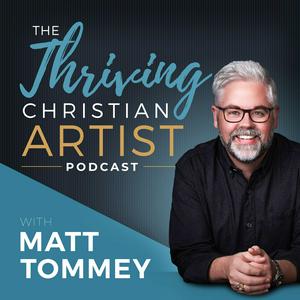
Get the free radio.net app
- Stations and podcasts to bookmark
- Stream via Wi-Fi or Bluetooth
- Supports Carplay & Android Auto
- Many other app features
Get the free radio.net app
- Stations and podcasts to bookmark
- Stream via Wi-Fi or Bluetooth
- Supports Carplay & Android Auto
- Many other app features


The Thriving Christian Artist
Scan code,
download the app,
start listening.
download the app,
start listening.








